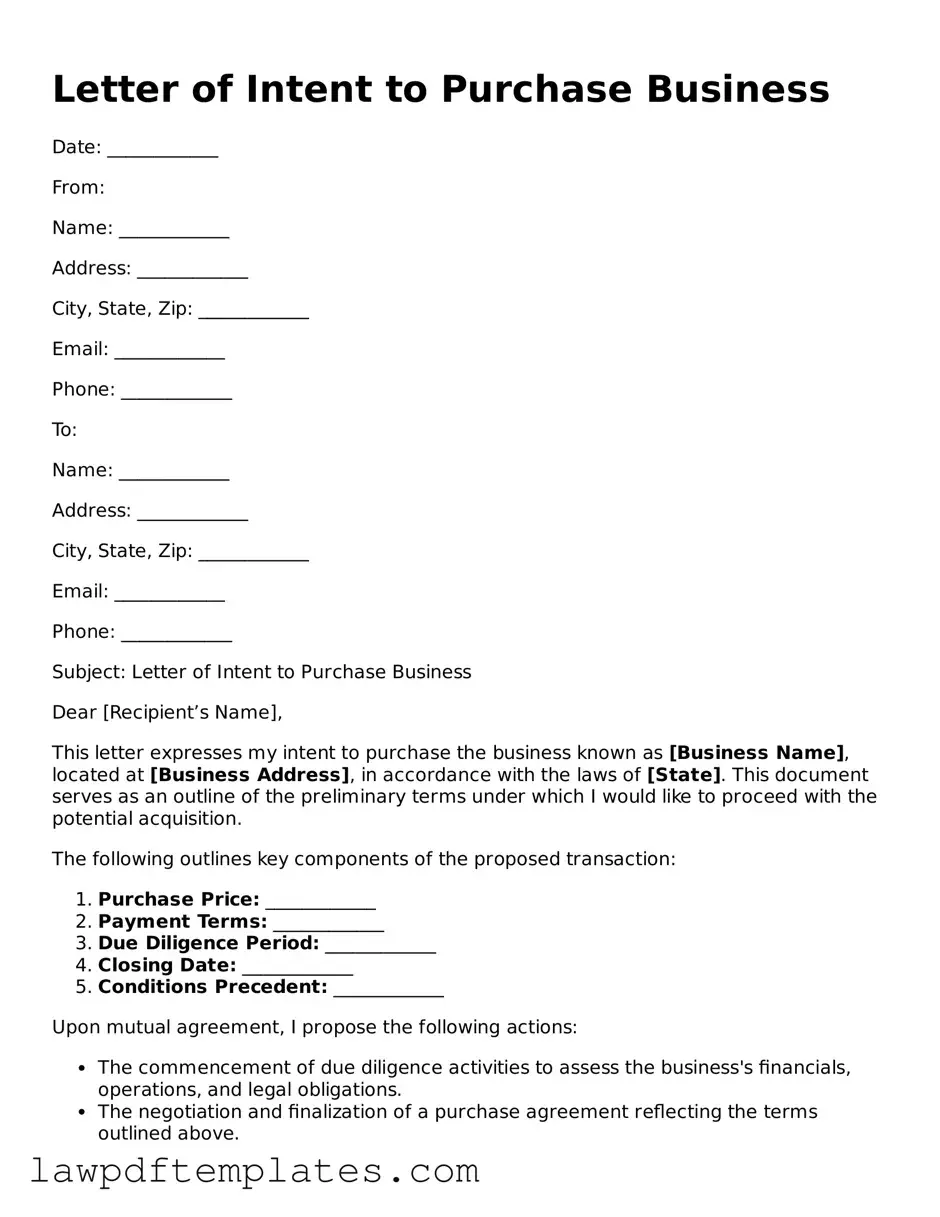Attorney-Approved Letter of Intent to Purchase Business Document
Form Breakdown
| Fact Name | Description |
|---|---|
| Purpose | A Letter of Intent (LOI) outlines the preliminary understanding between parties before finalizing a business purchase. It serves as a roadmap for negotiations. |
| Non-Binding Nature | Typically, an LOI is non-binding, meaning that the parties are not legally obligated to complete the transaction. However, certain provisions may be binding, such as confidentiality agreements. |
| Key Components | An LOI usually includes details like purchase price, payment terms, and a timeline for due diligence. These components help clarify expectations for both parties. |
| Governing Law | The governing law can vary by state. For instance, in California, the LOI would be governed by California contract law, while in New York, New York contract law would apply. |
| Importance of Clarity | Clear language in an LOI can prevent misunderstandings. Both parties should ensure that all terms are explicitly defined to avoid potential disputes later on. |
Sample - Letter of Intent to Purchase Business Form
Letter of Intent to Purchase Business
Date: ____________
From:
Name: ____________
Address: ____________
City, State, Zip: ____________
Email: ____________
Phone: ____________
To:
Name: ____________
Address: ____________
City, State, Zip: ____________
Email: ____________
Phone: ____________
Subject: Letter of Intent to Purchase Business
Dear [Recipient’s Name],
This letter expresses my intent to purchase the business known as [Business Name], located at [Business Address], in accordance with the laws of [State]. This document serves as an outline of the preliminary terms under which I would like to proceed with the potential acquisition.
The following outlines key components of the proposed transaction:
- Purchase Price: ____________
- Payment Terms: ____________
- Due Diligence Period: ____________
- Closing Date: ____________
- Conditions Precedent: ____________
Upon mutual agreement, I propose the following actions:
- The commencement of due diligence activities to assess the business's financials, operations, and legal obligations.
- The negotiation and finalization of a purchase agreement reflecting the terms outlined above.
- The execution of an exclusivity agreement, preventing engagement with other potential buyers during our negotiations.
This letter of intent is not binding and does not constitute a contract. However, it expresses my sincere interest in pursuing the acquisition of [Business Name]. I encourage further discussions to facilitate this potential transaction.
Please indicate your acceptance of this letter of intent by signing below and returning a copy. I look forward to your prompt response so we may proceed accordingly.
Sincerely,
______________________________
[Your Name]
[Your Title]
[Your Company Name]
Agreed and Accepted:
______________________________
[Recipient's Name]
[Recipient's Title]
[Recipient's Company Name]
Common mistakes
When completing a Letter of Intent to Purchase Business form, individuals often overlook critical details that can affect the outcome of their transaction. One common mistake is failing to clearly define the terms of the offer. Vague language can lead to misunderstandings between the buyer and seller. It is essential to specify the purchase price, payment terms, and any contingencies. This clarity helps ensure that both parties are on the same page and reduces the potential for disputes later on.
Another frequent error involves neglecting to include essential information about the business being purchased. Buyers should provide a detailed description of the business, including its legal structure, location, and key assets. Omitting this information can create confusion and may even raise red flags for the seller. A well-informed seller is more likely to engage positively with a buyer who demonstrates knowledge and seriousness about the transaction.
Many individuals also fail to consider the importance of including a timeline for the transaction. Without a clear timeline, the process can become disorganized and prolonged. Setting deadlines for due diligence, financing, and closing can help keep the transaction on track. This structured approach not only benefits the buyer but also instills confidence in the seller regarding the buyer’s commitment to the process.
Additionally, some buyers make the mistake of not addressing confidentiality in the Letter of Intent. Protecting sensitive business information is crucial, especially during negotiations. Including a confidentiality clause can safeguard both parties’ interests. This demonstrates professionalism and respect for the seller’s business, creating a more favorable negotiating environment.
Lastly, buyers often overlook the need for legal review of the Letter of Intent. Relying solely on their understanding can lead to missed opportunities or unforeseen complications. Engaging a legal professional ensures that the document is comprehensive and compliant with applicable laws. This step can save time and resources in the long run, as it helps avoid costly mistakes that could arise from poorly drafted agreements.
Consider Popular Types of Letter of Intent to Purchase Business Documents
Letter of Intent for a Job - Focuses on strengthening the relationship between the candidate and employer.
The Investment Letter of Intent form is an essential tool that not only clarifies the initial terms of an investment but also helps establish a solid foundation for the relationship between investors and funding-seeking entities. By utilizing resources such as the Free Business Forms, parties can ensure they have the correct templates and guidance to facilitate a smooth negotiation process, ultimately leading to successful investment outcomes.
Rental Letter of Intent - This document serves as a starting point for negotiations between the landlord and prospective tenant.
